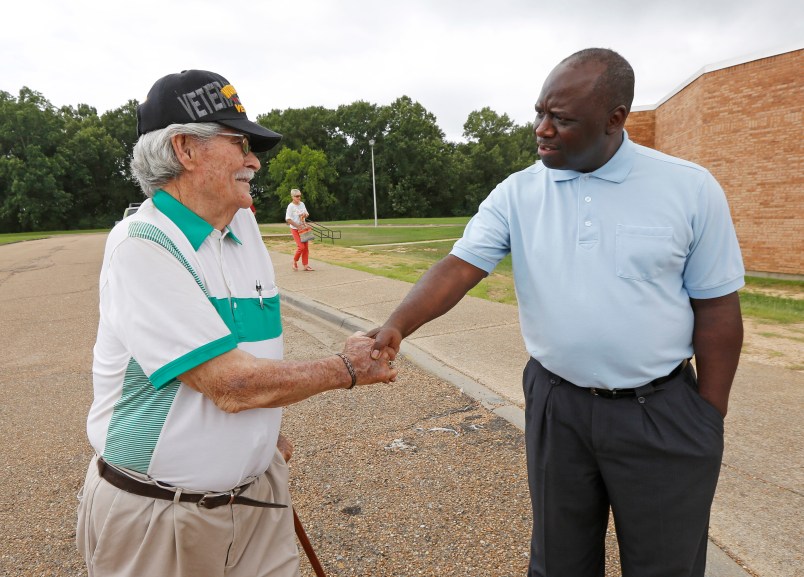The narrow re-nomination victory of six-term Republican Senator Thad Cochran in the Mississippi primary run-off may well mark a watershed moment in politics in the South. In his desperation to overtake Tea Party favorite Chris McDaniel, who beat him in the first round of the primary, Cochran hit upon a novel idea: to invite the black community into the final stage of the Republican Party nomination battle. On the campaign trail, Cochran said he had never been averse to helping out the African American community. By bringing home the bacon – federal spending and grants – to one of the most pork-laden states, Cochran bragged that he had helped buoy the interests of the poor in general and the state’s large black community in particular.
Can Democratic African American voters participate in a GOP primary? In Mississippi, election rules excluded only those voters who had already voted in the Democratic primary from voting in the Republican Party run-off. Since the Democratic candidate, Travis Childers, was uncontroversial but has almost no chance of winning statewide in the November 2014 general election, turnout in the Democratic primary was even lighter than normal. Thus, the vast majority of Mississippi’s black residents, roughly 40 percent of the population of the state, remained eligible to vote in the Republican primary run-off.
Although the complete story remains to be told, it appears that Mississippi’s black leaders recognized and took advantage of this historic opportunity, by urging their compatriots to vote in the GOP contest to gain a measure of meaningful clout in Mississippi politics. Since winning the right to vote in the 1960s, Mississippi blacks have voted as a bloc for Democratic candidates, while Mississippi white voters since the introduction of Nixon’s southern strategy have lined up as a bloc for Republicans. The whites outnumber the blacks, so blacks have always been marginalized in Mississippi politics. But by voting in this year’s contentious and evenly divided Republican primary, they have found a way to gain influence.
With the emergence of the Tea Party movement, somewhat more moderate Mississippi Republicans have found it increasingly challenging to win primaries. Yet now it is apparent that they have a new path to victory – one that runs through the African American community. Cochran’s re-nomination sets an example that other Republicans of his ilk may follow.
Will this moment bring policy changes to benefit Mississippi’s blacks and their communities? Here is the key point: African American voters don’t have to change their politics to participate in Republican Party primaries, but the GOP candidates may need to adjust to attract black votes. Tellingly, Cochran spoke in favor of full voting rights and participation in the course of his last-minute appeal for votes in African American areas. At the very least, Cochran will now have to be cognizant of who kept him in office – and if he keeps the pivotal support of African American constituents in mind, he may well moderate his politics to inoculate himself against pressure from the far right. Possibly, some of his allies in the Mississippi Republican establishment that worked so hard to defeat McDaniel will also be more willing to make policy concessions to African American citizens in their state.
Where else could less extreme Republican candidates successfully adopt Cochran’s strategy? Most likely, in states like Texas and South Carolina that combine a highly conservative general electorate with a large minority population. Should moderate Republicans succeed in using minority support to defeat Tea Party extremists in those states, the Cochran reelection in Mississippi could represent quite a watershed. It would not only be a remarkable sea change in what has become the sclerotic racial politics of the South, but the beginning of the end of the outsized influence of Tea Party forces on national Republican Party politics.
This analysis is part of a Scholars Strategy Network
Daniel Paul Franklin is Associate Professor of Political Science at Georgia State University. Click here to learn more about Dan’s research and advocacy.
Photo: Stanley D. Johnson, right, an Air Force veteran, thanks Fonzo Finch, a World War II veteran for his service, after both men voted at the poll at Siwell Middle School in Jackson, Miss., Tuesday, June 24, 2014. Johnson said he voted for incumbent U.S. Sen. Thad Cochran while Finch said he supports state Sen. Chris McDaniel in a runoff race for the state’s GOP nomination for senate. (AP Photo/Rogelio V. Solis)







This will certainly inspire deep south local governments to start building new voter-suppression walls. They will be registering Republicans and closing those open primaries in Mississippi before 2016, you can bet on that.
I fear you are right.
Voters will be pledging political parties like a fraternity without the beer, before this is over
I guess a 49 state strategy is better than nothing, but this Republican primary should really be a wake-up call to complacent Democrats. If the second worst Republican can really turn out 35,000 votes just like that, there’s no excuse for fielding a token candidate. When the incumbent comes that close to being knocked off, there’s no reason Democrats should be resigned to defeat.
It wasn’t just like that. Face it Mississippi is a the poorest state in the nation and it’s survival depends on the largess of the federal government. McDaniel gets elected that dries up and there was no chance the D was going to get elected no matter the strategy. So what do the leaders of the Mississippi black community do? They encourage their constituents to vote for the guy who isn’t a white supremacist and who has consistently brought home the bacon.